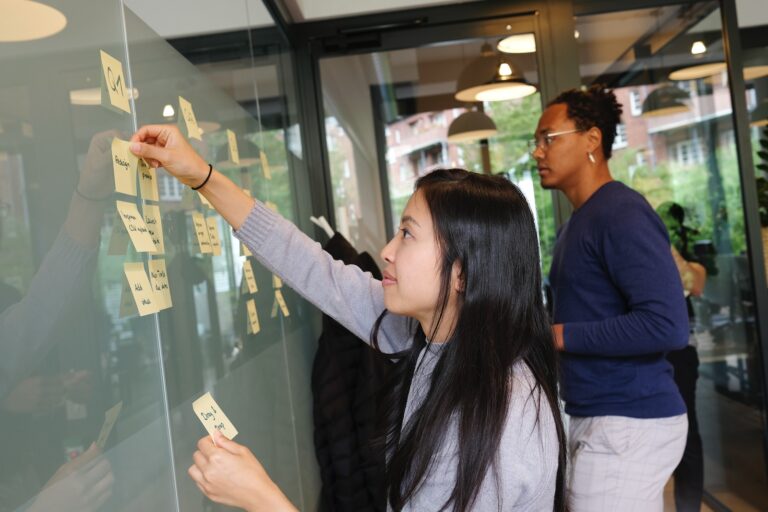Welcome to The Ultimate Guide to Making a Great First Impression
The Power of First Impressions: Why They Matter
When it comes to making a lasting impact, first impressions play a crucial role in shaping how others perceive us. Whether you’re meeting someone for the first time or stepping into a job interview, the initial moments can have a long-lasting ripple effect.
Research has shown that people form opinions about others within the first few seconds of meeting them. This means that the way you present yourself in those precious moments can significantly influence how others view your personality, competence, and trustworthiness.
Impact on Relationships and Opportunities: Unlocking Doors with Impressions
First impressions are not just about making small talk or putting on a smile; they can be the key to unlocking new relationships and opportunities in both personal and professional spheres. A positive first impression can set the foundation for building strong connections with others, fostering trust, respect, and rapport. In social settings, it can pave the way for forming meaningful friendships or romantic relationships.
In a professional context, a great first impression can open doors to job opportunities, collaborations, promotions, and even business partnerships. In essence, mastering the art of making a great first impression is not just about showcasing your best self; it’s about seizing the moment to create lasting impressions that leave an indelible mark on those you encounter.
By understanding the significance of these initial interactions and their impact on relationships and opportunities, you’ll be better equipped to navigate social dynamics with confidence and finesse. Stay tuned as we delve deeper into practical strategies for making memorable first impressions that set you apart from the crowd.
Dressing Appropriately and Confidently
Choosing the right outfit for a first impression is crucial in setting the tone for any interaction. Whether you’re dressing for a job interview, a date, or a social event, your clothing should reflect your personality while also being suitable for the occasion. Opt for attire that makes you feel comfortable and confident, as this will naturally boost your self-assurance.
Pay attention to details like color coordination, proper fit, and cleanliness to ensure you look put together and polished. Remember that it’s not about wearing the most expensive designer labels but rather about showcasing your personal style in a tasteful manner.
Practicing Good Hygiene and Grooming
Good grooming is an essential component of making a great first impression. Ensure that you start with basic personal hygiene practices such as showering regularly, brushing your teeth, and applying deodorant. Pay attention to grooming habits like keeping your nails clean and trimmed, maintaining well-groomed hair, and shaving or grooming facial hair neatly if applicable.
Remember to choose a pleasant fragrance that isn’t overpowering but leaves a subtle impression. Looking well-kempt not only shows respect for yourself but also conveys respect for those you are meeting.
Maintaining Positive Body Language
Body language can speak volumes before you even say a word. To convey confidence and approachability through body language, stand tall with shoulders back and maintain eye contact when engaging with others.
A warm smile can instantly make you more inviting and friendly. Avoid fidgeting or crossing your arms as these gestures can signal nervousness or defensiveness.
Mirroring the other person’s body language subtly can also help build rapport and establish connection. Remember that non-verbal cues are just as important as verbal communication in creating an impactful first impression.
Mastering Communication Skills
The Art of Active Listening and Engaging Conversations
Have you ever been in a conversation where the other person seems more interested in their phone than what you’re saying? It’s not the most pleasant experience, right? Active listening is like a superpower in the realm of communication.
It involves giving your full attention to the speaker, making eye contact, nodding in agreement, and responding appropriately. By actively listening, you show respect and genuine interest in what the other person has to say.
Engaging conversations aren’t just about talking; they are about building connections with others through meaningful dialogue. So next time you find yourself drifting off into your thoughts during a conversation, bring yourself back to the present moment and practice active listening.
Using Eye Contact Effectively: The Gateway to Connection
Eyes are often referred to as windows to the soul for a reason – they convey emotions, interest, and sincerity without saying a word. When engaging in a conversation or making a first impression, maintaining good eye contact can make all the difference.
It shows confidence, respect, and attentiveness. However, there’s a fine line between making eye contact and staring down someone like you’re challenging them to a staring contest!
The key is finding that balance where your gaze is warm and inviting while still being respectful of personal boundaries. So next time you meet someone new or engage in a discussion, remember that eyes speak louder than words.
Showcasing Genuine Interest in Others: The Secret Ingredient
Imagine having a conversation with someone who seems genuinely interested in getting to know you – it feels like magic! Showing genuine interest involves asking thoughtful questions about the other person’s experiences, opinions, and aspirations. It’s not just about waiting for your turn to talk; it’s about creating space for others to share their stories comfortably.
When you show curiosity and empathy towards others, it paves the way for deeper connections and memorable interactions. So whether you’re at a networking event or meeting someone for the first time, remember that showcasing genuine interest can elevate your communication skills to new heights.
Demonstrating Professionalism and Politeness
Being Punctual and Respectful of Others’ Time
Being punctual is a key aspect of making a great first impression. Arriving on time shows that you value the other person’s time and are reliable. It sets a positive tone for the interaction and demonstrates your professionalism.
If you find yourself running late, it’s important to communicate this promptly and sincerely apologize for any inconvenience caused. Respecting others’ time also means being mindful of not overstaying your welcome during a conversation or meeting.
Displaying Confidence Without Arrogance
Confidence is attractive, but it’s essential to strike a balance and avoid coming across as arrogant. Confidence should be conveyed through your body language, tone of voice, and the way you carry yourself.
It’s about having faith in your abilities without belittling others or boasting excessively about yourself. Showcasing humility alongside confidence can make a powerful combination that leaves a lasting positive impression on others.
Expressing Gratitude and Appreciation
Expressing gratitude and appreciation towards others is a simple yet impactful way to demonstrate politeness. Saying “thank you” genuinely when someone does something nice for you or offers help goes a long way in building rapport.
Additionally, showing appreciation for someone’s time or input shows that you value their contribution. Small gestures like sending a follow-up thank-you note after a meeting or expressing gratitude in person can leave a memorable mark on the other person and strengthen the relationship.
Understanding Cultural Norms and Etiquette
In today’s diverse world, understanding and respecting cultural norms and etiquette is crucial when making a good first impression. Different cultures have unique customs and traditions that dictate appropriate behavior in social interactions. For example, in some cultures, it is customary to greet others with a bow or a handshake, while in others, a kiss on the cheek may be more common.
Knowing these nuances can help you navigate social situations with ease and show respect for others’ backgrounds. Furthermore, being aware of cultural norms can also prevent unintentional misunderstandings or offenses.
For instance, in some cultures, direct eye contact is seen as a sign of confidence and honesty, while in others it may be considered rude or confrontational. By familiarizing yourself with these cultural differences, you can adapt your behavior accordingly and avoid any potential missteps that could harm your first impression.
Respecting Diversity in Communication Styles
Communication styles vary greatly across different cultures, ranging from direct and assertive to indirect and subtle. Respecting diversity in communication styles means being open-minded and flexible in your approach to conversations. Some cultures value concise and straightforward communication, while others prefer more context-rich storytelling.
By acknowledging these differences and adjusting your communication style accordingly, you demonstrate sensitivity to cultural nuances and create a positive impression of inclusivity. Moreover, respecting diverse communication styles also involves actively listening to others without imposing your own cultural biases.
It’s essential to show genuine interest in understanding the perspectives of people from different backgrounds by asking questions respectfully and staying open to new ideas. This not only fosters better relationships but also showcases your adaptability and willingness to connect with individuals from various cultural backgrounds.
Adapting to Different Social Contexts
Adapting to different social contexts requires flexibility and awareness of the specific environment you are in. Whether you are attending a formal business meeting or a casual social gathering, knowing how to adjust your behavior can significantly impact the impression you make on others.
In some cultures, punctuality is highly valued, while in others arriving slightly late may be more acceptable. Being able to read social cues and adapt your demeanor accordingly demonstrates your attentiveness and consideration for those around you.
By observing the behaviors of others within a particular social context, you can mirror their actions appropriately without compromising your authenticity. Showing sensitivity towards varying social norms not only allows for smoother interactions but also showcases your ability to navigate diverse environments with grace and respect.”
Avoiding Negative Body Language Habits
When trying to make a great first impression, your body language speaks volumes before you even say a word. Avoiding negative body language habits is crucial.
Crossed arms can signal defensiveness or closed-off attitude, so keep your arms relaxed by your sides. Fidgeting, like tapping your foot or playing with your hair, can be distracting and show nervousness.
Instead, try to maintain open and confident body language by standing tall with shoulders back. Eye contact is essential for building trust and connection during initial interactions.
Avoiding eye contact can come across as insincere or disinterested. However, staring intensely can be perceived as aggressive or uncomfortable.
Aim for a balance by making regular eye contact while also giving the other person space to speak and look away naturally. This demonstrates engagement and respect in the conversation.
Smiling is a universal sign of warmth and approachability, but forcing a smile can appear insincere. A genuine smile reaches the eyes and lights up your face naturally.
Avoid fake smiles that don’t reach your eyes or seem forced. A warm and authentic smile can instantly create a positive atmosphere during first encounters.
Steer Clear of Overbearing Behavior
While it’s important to show confidence in making a great first impression, being overbearing can have the opposite effect. Dominating conversations, interrupting others frequently, or monopolizing attention can be off-putting to those you’re trying to impress.
Practice active listening by allowing others to speak without constantly interjecting with your thoughts or experiences. Avoid coming on too strong by respecting personal boundaries and social cues from the other person.
Pushing for too much personal information or moving too quickly in building rapport can make the other party feel uncomfortable or pressured. Instead, take cues from their responses and pace yourself accordingly in sharing about yourself or asking questions.
Managing Nervousness or Anxiety
Feeling nervous before making a first impression is completely normal but managing that anxiety is key to presenting yourself confidently. Take deep breaths to calm nerves before entering a new social setting or meeting someone important for the first time. Practice positive self-talk by affirming your strengths and capabilities rather than focusing on potential shortcomings.
Remember that everyone experiences nerves in unfamiliar situations; it’s how you handle them that sets you apart. By acknowledging and addressing your nervousness through preparation and positive mindset shifts, you’ll be better equipped to make a memorable first impression confidently.
Crafting an Impressive Online Presence
In this digital age, your online presence is often the first impression you make on others. To create a strong online persona, start by updating your social media profiles with professional and engaging content.
Use a high-quality profile picture that conveys your personality and professionalism. Make sure your bio or “About Me” section accurately reflects who you are and what you do.
Showcase your expertise by sharing industry-related articles, projects you’ve worked on, or achievements you’re proud of. Remember, consistency is key across all platforms to maintain a cohesive online brand.
Utilizing Video Call Etiquette
With the rise of remote work and virtual meetings, mastering video call etiquette is crucial for making a great first impression. Start by setting up a professional-looking background free from distractions.
Ensure proper lighting so others can see you clearly on camera. Dress appropriately as you would for an in-person meeting to show respect for the occasion.
When speaking, maintain eye contact with the camera to simulate direct eye contact with participants. Remember to mute yourself when not speaking to avoid background noise disruptions.
Following Up with a Thoughtful Message
After a virtual meeting or networking event, it’s essential to follow up with a thoughtful message to reinforce your positive first impression. Express gratitude for the opportunity to connect and briefly mention something specific from your interaction that resonated with you. Personalize your message to show genuine interest in building a relationship or furthering collaboration.
Keep the tone professional yet friendly, and don’t forget to include any action items discussed during the meeting or event. A well-crafted follow-up message can leave a lasting impact and set the stage for future interactions.
Fine-Tuning Your Personal Brand for Lasting Impressions
Consistency Across Interactions
Creating a strong personal brand requires consistency in how you present yourself across various interactions and platforms. Whether you’re networking at a social event, engaging with colleagues at work, or showcasing your skills online, maintaining a consistent image is key.
This means aligning your values, communication style, and overall demeanor in a way that reflects your authentic self. By being consistent in how you present yourself, you build trust and credibility with others, leaving a lasting impression that resonates.
Building Trust through Authenticity
Authenticity is the cornerstone of building trust with others. When you are genuine and true to yourself in your interactions, people are more likely to trust and connect with you on a deeper level.
Avoid putting on a façade or trying to be someone you’re not just to impress others. Instead, focus on being transparent about your strengths, weaknesses, and values.
Embrace your uniqueness and let your true personality shine through in every interaction. Authenticity not only helps build trust but also sets you apart from others by highlighting what makes you special.
Seeking Feedback for Continuous Improvement
Feedback is invaluable when it comes to fine-tuning your personal brand for lasting impressions. Don’t shy away from seeking constructive feedback from trusted friends, mentors, or colleagues.
Listen attentively to their insights and suggestions for improvement without taking it personally. Use feedback as an opportunity for growth and self-reflection.
By actively seeking feedback and implementing positive changes based on it, you demonstrate humility and a willingness to evolve continuously. Remember that feedback is a gift that can help refine your personal brand and make your first impressions even more impactful.
Conclusion
The Power of First Impressions: A Lasting Impact
Making a great first impression is not just about a single interaction—it’s about setting the tone for all future interactions. By taking the time to prepare, master communication skills, and demonstrate professionalism, you are not only making a positive impact on others but also opening doors to new opportunities. Remember, you have the power to shape how others perceive you, so make it count!
Authenticity and Consistency: Keys to Long-Term Success
As we’ve explored various strategies for making a great first impression, one key theme that emerges is the importance of being authentic and consistent. Building trust with others requires genuine interactions and a true reflection of who you are. By staying true to yourself and maintaining consistency in your behavior, you can create lasting impressions that stand the test of time.
Embrace the Journey: Every Interaction is an Opportunity
Making a great first impression is not just a skill but an art that can be honed over time. Instead of viewing each interaction as a daunting task, embrace it as an opportunity to connect with others and showcase your best self.
Remember that every encounter holds potential for growth and learning. So go forth with confidence, be kind to yourself in moments of imperfection, and trust in the power of positive first impressions to pave the way for fulfilling relationships and exciting opportunities ahead!






